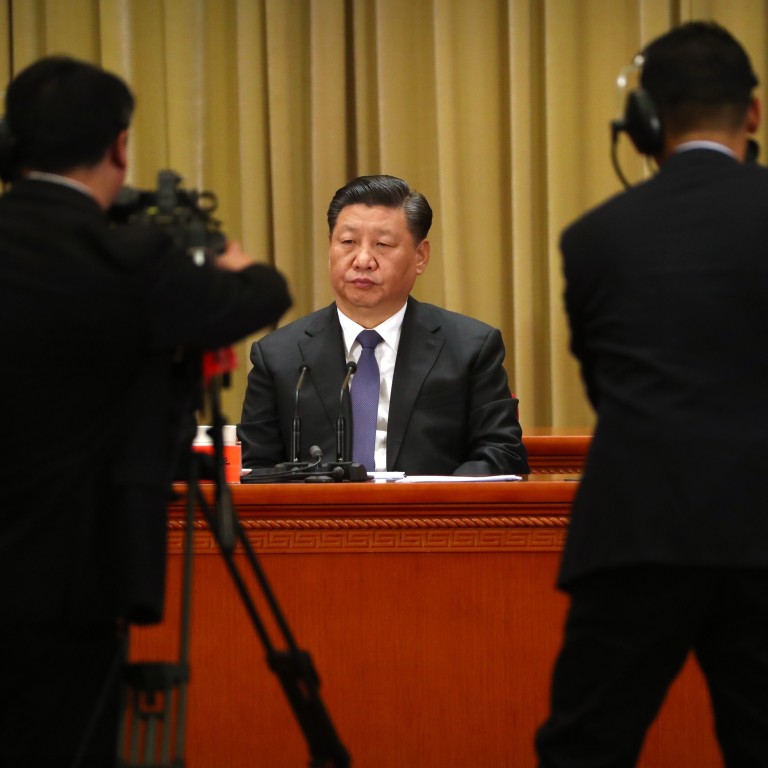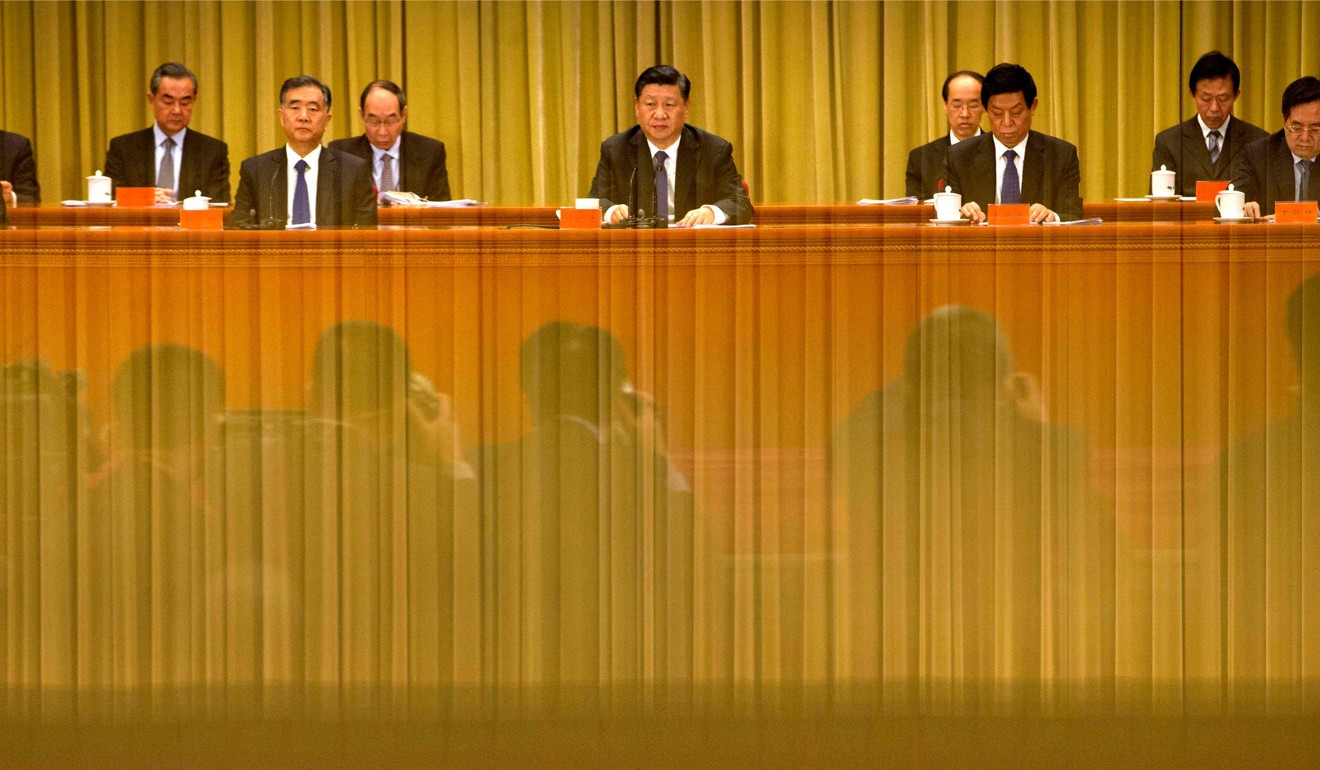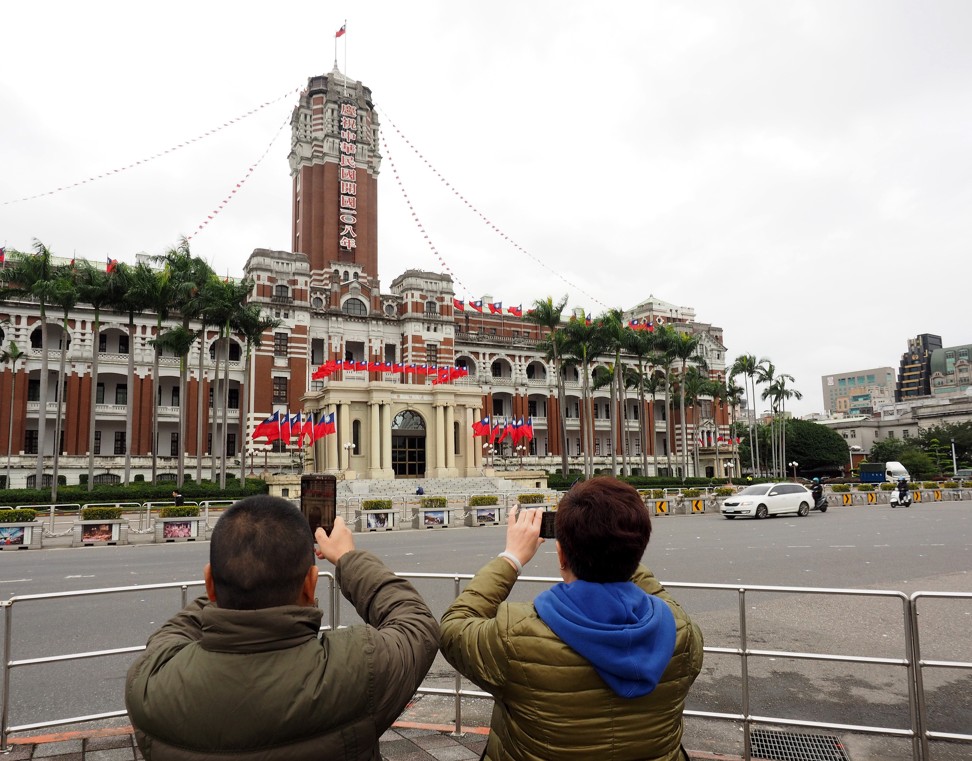
China’s reunification of Taiwan: are Taipei and Beijing locked in a zero-sum game?
- Speeches by Xi Jinping and Tsai Ing-wen show they are poles apart on key issues
- Taipei rejects ‘one country, two systems’ model, which Beijing sees as linchpin for reunification
Taiwan on Wednesday flatly rejected calls by Chinese President Xi Jinping for the two sides to adopt the “one country, two systems” model to resolve their conflicts, which analysts said was clear evidence of the zero-sum game the two leaders were now playing.
In a speech given earlier in the day to mark the 40th anniversary of Beijing’s call to end military confrontation across the Taiwan Strait, Xi said the two sides should begin talks on reunification as a way to settle 70 years of differences.
Xi Jinping urges Taiwan to follow Hong Kong model for unification
But Taiwanese President Tsai Ing-wen was quick to show her disdain for the idea.
“As president of the Republic of China [Taiwan’s official title], … I must solemnly point out that we have never accepted the ‘1992 consensus’ out of the concern that the so-called consensus defined by Beijing authorities only means ‘one China’ and ‘one country, two systems,’” she said.
“What [Xi] said today has verified our concerns, and I must reiterate here that Taiwan will never accept ‘one country, two systems’, and the majority opinion in Taiwan is also against it,” she told a news conference held just hours after Xi’s speech.
She said that Taiwan was willing to talk with Beijing, but only as a democratic government, and that any political negotiations across the strait must be authorised and supervised by the legislature and conducted under the government-to-government model.
“No individuals or organisations can represent the Taiwanese public in political talks” with Beijing, she said, in a clear snub to Xi’s calls for reunification talks, given that the independence-leaning Democratic Progressive Party she represents controls the legislature and is vehemently opposed to such negotiations.
Tsai Ing-wen tells Beijing it ‘must’ respect island’s sovereignty, people’s choices
Taiwan and the mainland have been divided since Chinese Nationalist, or Kuomintang, forces were defeated by the Communists in the civil war and retreated to the island in 1949. In the seven decades since, relations across the strait have been tense, with the threat of military confrontation ever present.
On January 1, 1979, Beijing ended decades of regular artillery bombardment of Taiwan-controlled islands off the mainland, and in a public letter to the Taiwanese known as the “message to compatriots in Taiwan”, called for an end to military confrontation across the strait.
Tsai said in her New Year’s Day address on Tuesday that she was “very clear” about her administration’s position, and that “China must positively take into account the fact of the existence of ‘Republic of China, Taiwan’ and refrain from denying the democratic and national system established by the people of Taiwan”.
As China tests military muscle, PLA warns Taiwan efforts to resist reunification with force are dead end
Despite pressure from Beijing, Tsai said her administration had not done anything to provoke the mainland and would not do so in the future. In contrast, Beijing had wooed Taiwan’s diplomatic allies, held war games to intimidate the island, and even refused to cooperate with Taipei in stamping out the deadly African swine fever, which has killed millions of pigs on the mainland and threatened to wreak havoc in Taiwan, she said.
Beijing, which considers Taiwan a wayward province awaiting reunification, by force if necessary, suspended official exchanges with Taipei when Tsai was elected president in 2016 and refused to accept the “1992 consensus”, which allows the two sides to continue to talk as long as they acknowledge there is only one China.
China’s military priorities for 2019: boost training and prepare for war
Analysts said that in his speech Xi not only set out guidelines for possible reunification through the “one country, two systems” model now adopted in Hong Kong and Macau, but also redefined the 1992 consensus as an understanding that the two sides would work towards reunification.
“By emphasising that the two sides of the Taiwan Strait belong to one China and that they must seek to reunite, plus the resolute opposition to ‘two Chinas’ or ‘one China and one Taiwan’ or Taiwan independence, Xi has rejected Tsai’s insistence of Taiwan’s sovereignty and denied the existence of the ‘Republic of China, Taiwan’,” said Wang Hsin-hsien, director of the Graduate Institute of East Asia Studies at National Chengchi University.

Wang Kung-yi, a professor of political science at Chinese Culture University in Taipei, said the speeches by Xi and Tsai showed how far the two leaders were from reaching a consensus, but said Beijing’s stance was relatively conciliatory considering the comments coming from the more hawkish factions of the mainland’s military.
“It is understandable that Taiwan, especially under the Tsai administration, rejected Xi’s calls given the pro-independence platform of the DPP,” he said. “But Xi’s speech will remain as a guideline for the handling of cross-strait issues in the future, and the Taiwanese authorities cannot ignore it.”
Shanghai, Taipei rebuild cross-strait ties after Taiwan’s local elections
Also, regardless of whether the Tsai government accepted Xi’s proposals, Beijing would push ahead with its plan to have the island select representatives for talks to “institutionalise the arrangement” of any possible framework for future reunification, Wang said.
While Taiwan’s Mainland Affairs Council and the DPP described Xi’s speech as a highly political overture aimed at destroying the sovereignty of Taiwan, the KMT said it was important for the two sides to continue to work together under their own political systems, as most people in Taiwan wanted to maintain the status quo.


